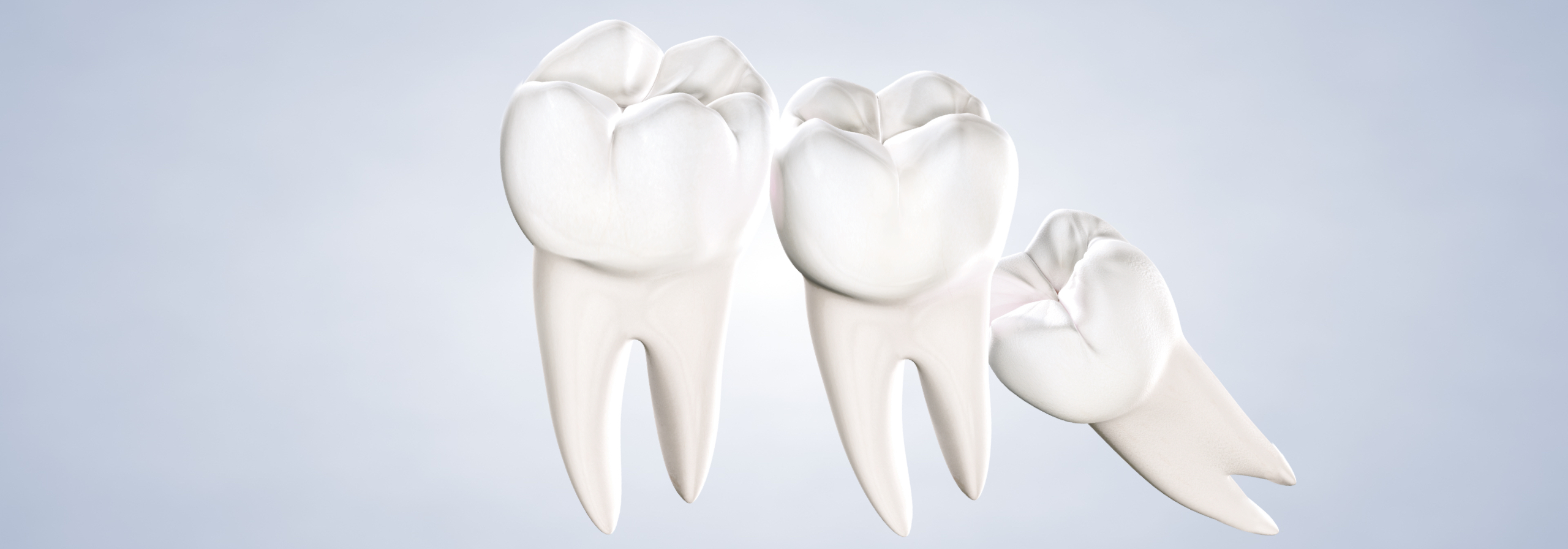
Wisdom teeth, or third molars, are the very last set of teeth that may develop in the mouth. The average mouth can only hold 28 teeth, so it can be problematic when an additional set of molars tries to squeeze in. Third molars often make an appearance between the ages of 17 and 21, although some people develop them later in life. Dental professionals recommend having these teeth extracted as soon as possible; left untreated, wisdom teeth can affect your dental health.
Some individuals don’t develop wisdom teeth at all and, therefore, never need to have a wisdom teeth removal procedure. Others can develop just one or two wisdom teeth, all four wisdom teeth, or in some circumstances, more than four wisdom teeth. At your regular dental checkups, your dentist takes X-rays of your teeth. If he or she discovers the presence of wisdom teeth, you will be referred to an oral and maxillofacial surgeon for treatment.
Impacted Wisdom Teeth
It’s very rare for a wisdom tooth to develop and erupt into the dental arch without causing problems. Sometimes, the wisdom tooth becomes trapped beneath the gums, known as impaction. Impacted wisdom teeth will not properly erupt and must be surgically removed. They can grow sideways or at an angle toward adjacent molars, causing them damage and pushing them out of alignment.
Some wisdom teeth only partially erupt through the gums. This makes it easy for food and bacteria to become trapped around it. If it becomes infected, cysts or tumors can grow around the tooth. Infection can also cause ongoing bad breath and discomfort when chewing.
To avoid these problems, have all of your wisdom teeth extracted by an oral surgeon as soon as possible. When it comes to oral health advice, diagnosis, and treatment, oral surgeons are the experts of wisdom teeth and other oral and maxillofacial conditions.
Why Remove Wisdom Teeth?
In addition to there not being enough room in the mouth for this set of molars, wisdom teeth are not necessary for oral function. You already have molars responsible for chewing food and do not need additional molars. These extra teeth can lead to numerous oral health issues if left untreated, such as:
- Pain
- Swelling
- Infection
- Cysts
- Tumors
- Tooth decay
- Dental shifting
- Dental crowding
- Damage to other teeth and surrounding tissues
- Gum disease
When your wisdom teeth are removed by an oral surgeon, you eliminate the risk of them causing these issues. Having them extracted will make it easier to maintain good oral hygiene without having to worry about third molars.
Signs and Symptoms of Wisdom Teeth
Some people don’t know they have wisdom teeth because they do not feel any pain or pressure from them. However, wisdom teeth can exist without causing any discomfort. This is why it’s important to see your dentist every 6 months. The sooner wisdom teeth are detected and removed, the better.
If you experience any of the following, you may have wisdom teeth:
- Swelling of the gum tissue
- Pain or pressure in the back of the mouth
- Tender gums, or gums that bleed easily
- A bad taste in your mouth
- Chronic bad breath
Schedule an appointment with an oral surgeon if you experience these symptoms. It may be time to have your wisdom teeth extracted.
Wisdom Tooth Removal Surgery
The surgery to have your wisdom teeth removed is performed in a single visit in an oral surgeon’s office. The procedure typically takes 1 hour, but this varies depending on the number of third molars you have and if any are impacted.
Most patients undergo IV sedation for this procedure. This type of sedation will render you into a sleep-like state, unable to feel pain, but conscious enough to answer questions asked by your surgeon. You will wake up when the sedation wears off with no memory of the surgery. This differs from general anesthesia, which renders you completely unconscious.
Once the sedation has taken effect, your oral surgeon will extract any erupted teeth with forceps. If teeth are impacted, he or she will make a small incision in the gum tissue to access the tooth. Large wisdom teeth may be broken into smaller pieces to make removal easier. Your surgeon will place sutures as needed, and you will rest comfortably in the office until the sedation wears off.
Expect to be sleepy for the rest of the day. You must arrange for an adult to drive you home after undergoing IV sedation. Many patients return to their regular routines in just a day or two following wisdom tooth removal. It will take about 2 weeks for the surgical sites to heal. Be sure to follow the instructions your surgeon provides closely. This will ensure you maintain good oral hygiene during recovery and prevent dry socket from occurring.
Who Extracts Wisdom Teeth, Dentists or Oral Surgeons?
Oral surgeons specialize in the diagnosis, treatment, and management of the head, neck, mouth, and face. After a dentist earns a dental degree, he or she can begin practicing immediately. Oral surgeons, however, must complete a residency program of 4–6 additional years of training. During this time, oral surgeons gain hands-on experience performing a variety of surgical procedures. Oral surgeons are the only dental professionals qualified to administer all forms of anesthesia, including general anesthesia.
Dentists will often be the first to notice wisdom teeth. Once this happens, the dentist refers the patient to an oral surgery office. The oral surgeon then takes 3D scans of the patient’s mouth and face and creates a treatment plan. In some cases, dentists perform simple tooth extractions in their office, but when a patient requires more complex surgery, diagnosing, or anesthesia, they see an oral surgeon.